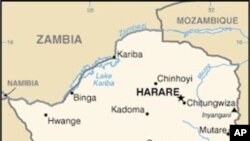Authorities running Zimbabwe's constitutional revision process fared somewhat better on the second day of a public outreach phase Thursday following widespread chaos the day before, but many consultative meetings still failed to take place or were called off for reasons ranging from logistics to disruption to threats of violence.
Officials said incidents of disruption or intimidation were isolated, but accounts from around the country suggested the process is highly vulnerable in certain provinces to elements aiming to derail or delay it.
Co-Chairman Douglas Mwonzora of the Parliamentary Select Committee on Constitutional Revision said the reports of violence or intimidation were isolated and did not warrant much concern.
Independent monitor Tadziripira Khumalo told reporter Jonga Kandemiiri in an interview from Manicaland that the process ran better on Thursday though people were still being harassed by war veterans.
Correspondent Sylvia Manika reported from Harare that the outreach process in Chinhoyi, Mashonaland West, was especially troubled as teams seeking to gather views abandoned the exercise when they were threatened.
In Mutare North constituency of eastern Manicaland province, sources said liberation war veterans and known ZANU-PF activists barred entry to meetings by supporters of the Movement for Democratic Change formation of Prime Minister Morgan Tsvangirai, and individuals whose garments suggested affluence.
Outreach teams were unable to master the situation as the war veterans verbally attacked Prime Minister Morgan Tsvangirai and his MDC formation. At a Mutare North venue called Mount Zonwe, sources said war veterans were forcing local Zimbabweans to vote on the questions asked, rather than speaking their minds.
In Manicaland's Chimanimani West constituency, sources said war veterans and soldiers in civilian garb forced villagers to surrender their political party membership cards before allowing them to enter meetings.
Seven public consultative meetings were put off in Chinhoyi, Mashonaland West, because unruly elements said the meetings could not go ahead in the absence of police. Parliamentary officials in Mashonaland West called for a meeting between local representative of the main political parties and the war veterans.
Some participants complained that others attending were unknown in the ward, demanding their exclusion.
Sources in the western Matabeleland region said the atmosphere was generally peaceful, though outreach meetings had not gotten under way in many locations. In the Matabeleland capital of Bulawayo, venues and dates were announced but authorities turned away people who seemed eager to participate. Venues for outreach meetings were advertised in Lupane, Matabeleland North, but no firm dates were set.
Activists in Plumtree, Matabelaland South, said most people in rural areas were unaware of the outreach process or how to participate. State radio and television signals cannot be received in that area where residents rely on broadcasts from South Africa or Botswana for news and information.
Reception is also problematic in Nkayi, Matabeleland South, but activists said they are waiting for outreach teams.
Believe Gaule, constitutional outreach leader for Bulawayo (itself one of Zimbabwe's 10 provinces) and Matabeleland North, said his team is preparing to deploy despite logistical problems. Teams led by Edward Mkhosi in Plumtree were also getting ready to launch meetings despite logistical and other problems.
Sources said teams were having difficulty informing residents of the meetings as funding is scarce for flyers, posters and other informational materials.
MDC officials and supporters in Mudzi, Mashonaland East, reported incidents of violence in the past few days and said they were harassed by ZANU-PF supporters when they tried to speak during outreach meetings.
VOA Studio 7 correspondent Irwin Chifera reported that the homes of MDC supporters in Mudzi and surrounding villages have been burned, but the police have taken no action.
Officials of the General Agricultural and Plantation Workers Union reported intimidation of members in the run-up to the outreach phase. The organization has asked civic monitoring groups to follow the process on farms where tension has been running high, according to GAPWUZ information officer Tapiwa Zivira.
For further perspective on the troubled outreach process VOA Studio 7 reporter Sandra Nyaira spoke with Crisis in Zimbabwe Coalition Coordinator McDonald Lewanika and Beatrice Nyamupinga, chairwoman of the Parliamentary Women's Caucus. Nyamupinga said the turmoil shows that the parliamentary committee running the process has failed in its task and that ordinary Zimbabweans were not ready for such a daunting process.





